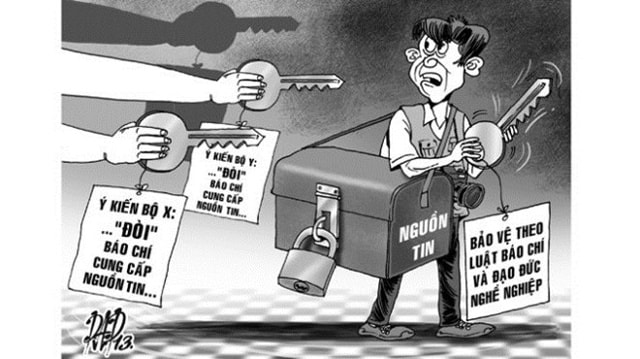The 2016 Press Law increases journalists' rights to protect sources of information.
Protecting the confidentiality of information sources is the right and obligation of journalists while working. It is also what makes people trust when providing information to the press. The new Press Law continues to inherit this viewpoint and makes it clearer, increasing the rights of journalists.
Regulations on protection of information sources have also been included in the Press Law 1989, 1999. It is also one of the principles of press operation.
 |
| According to the new Press Law, unless it is a case in the law, no one is allowed to question a journalist's source of information (Picture: Tuoi Tre Newspaper) |
The 1999 Press Law stipulates: “The press has the right and obligation not to disclose the name of the person providing information if it is harmful to that person, except in cases where there is a request from the Chief Prosecutor of the People's Procuracy or the Chief Justice of the People's Court at the provincial level or equivalent or higher, necessary for the investigation and trial of serious crimes.”
Meanwhile, the new Press Law stipulates: “Press agencies and journalists have the right and obligation not to disclose information providers, except in cases where there is a written request from the Chief Prosecutor of the People's Procuracy, Chief Justice of the People's Court at the provincial level or equivalent or higher, necessary for the investigation, prosecution, and trial of very serious and especially serious crimes.”
Meanwhile, Article 9 of the 2015 Penal Code, effective from July 1, 2016, defines “very serious crimes” and “especially serious crimes” as follows:
“Very serious crimes are crimes of a very great nature and level of danger to society for which the highest level of the penalty prescribed by this Code for such crimes is from over 7 years to 15 years in prison; Particularly serious crimes are crimes of a very great nature and level of danger to society for which the highest level of the penalty prescribed by this Code for such crimes is from over 15 years to 20 years in prison, life imprisonment or death penalty”.
Thus, the new Press Code provides clearer regulations and increases the right of journalists to protect their sources of information. Journalists are only required to provide sources of information when requested in writing by the Chief Prosecutor of the People's Procuracy at the provincial level or higher, or the Chief Justice of the People's Court at the provincial level or higher, and it must be "necessary for the investigation, prosecution, and trial of very serious and especially serious crimes".
Previously, there was no provision that "must be in writing" and only "investigate and try serious crimes" (Serious crimes are crimes of a nature and level of great danger to society for which the highest level of the penalty prescribed by this Code for that crime is from over 03 years to 07 years in prison).
Article 38. Providing information to the press 1. Within the scope of their authority and duties, responsible agencies, organizations and individuals have the right and obligation to provide information to the press and are responsible before the law for the content of the information provided. Information provided to the press can be in writing, on a general electronic information website, press conferences, interviews and other forms. Press agencies must accurately use the information provided and must clearly state the source of the information. 2. Competent agencies, organizations and individuals have the right to refuse to provide information to the press in the following cases: a) Information in the list of state secrets, secrets under the principles and regulations of the Party, personal privacy secrets and other secrets as prescribed by law; b) Information about cases under investigation or pending trial, except in cases where state administrative agencies and investigation agencies need to inform the press about issues beneficial to investigation activities and the fight against crime; c) Information about cases under inspection without inspection conclusions; cases in the process of resolving complaints and denunciations; disputes and conflicts between state agencies that are in the process of being resolved, without official conclusions from competent authorities, and not yet permitted to be announced according to law; d) Policy documents and projects in the process of drafting that have not yet been permitted for publication by competent authorities according to law. 3. For cases that are under investigation and prosecution but have not yet been tried, negative cases or cases with signs of law violations but have not yet been concluded by competent state agencies, the press has the right to inform based on its own sources of documents and is responsible before the law for the content of the information. 4. Press agencies and journalists have the right and obligation not to disclose information providers, except in cases where there is a written request from the Chief Prosecutor of the People's Procuracy, Chief Justice of the People's Court at the provincial level or equivalent or higher, necessary for the investigation, prosecution and trial of very serious and especially serious crimes. The Chief Prosecutor of the People's Procuracy and the Chief Justice of the People's Court at the provincial level and equivalent or higher are responsible for organizing the protection of information providers; law enforcement agencies are responsible for coordinating with the Chief Prosecutor of the People's Procuracy and the Chief Justice of the People's Court at the provincial level and equivalent or higher to protect information providers. 5. State administrative agencies are responsible for appointing spokespeople, making statements and providing information to the press periodically, suddenly and irregularly. The Government shall detail the speaking and provision of information to the press by state administrative agencies. (Excerpt from the newly promulgated Press Law, effective January 1, 2017) |
According to Infonet
| RELATED NEWS |
|---|
